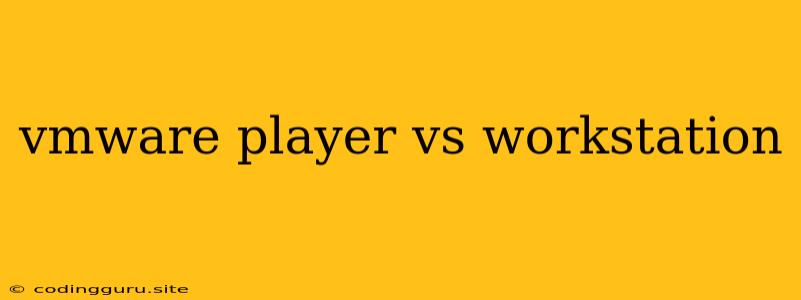VMware Player vs Workstation: Which One is Right for You?
Virtualization is a powerful tool that allows users to run multiple operating systems on a single physical computer. This is great for testing software, running legacy applications, or simply having a separate environment for your work. Two of the most popular virtualization software solutions available are VMware Player and VMware Workstation. While both products come from the same company, they serve different purposes and cater to different user needs. So, how do you choose the right one for you?
This article will explore the key differences between VMware Player and VMware Workstation, focusing on their features, functionality, and intended audience. We'll also consider pricing, performance, and other important aspects to help you make an informed decision.
What is VMware Player?
VMware Player is a free virtualization software designed primarily for personal use. It allows you to run virtual machines (VMs) on your computer, but it doesn't offer the advanced features and customization options found in VMware Workstation.
Key features of VMware Player:
- Free for personal use: No licensing fees are required for non-commercial use.
- Simple and easy to use: The interface is designed to be user-friendly, making it easy for beginners to get started.
- Basic VM creation and management: Create, run, and manage virtual machines with ease.
- Supports a wide range of operating systems: VMware Player supports various operating systems, including Windows, Linux, macOS, and more.
- USB and network support: Connect your virtual machines to USB devices and networks for seamless integration.
What is VMware Workstation?
VMware Workstation is a paid virtualization software designed for both personal and professional use. It offers a comprehensive set of features and tools, making it ideal for developers, system administrators, and anyone requiring advanced virtualization capabilities.
Key features of VMware Workstation:
- Powerful virtualization engine: Offers advanced features like snapshotting, cloning, and network customization.
- Enhanced VM customization: Configure and manage virtual machines with greater control and flexibility.
- Support for multiple virtual processors and memory: Run more demanding applications and VMs with ease.
- Advanced networking options: Set up complex network configurations for testing and development.
- Remote access and management: Connect to and manage VMs remotely through the VMware vSphere Client.
VMware Player vs. Workstation: Head-to-Head Comparison
Here's a breakdown of the key differences between VMware Player and VMware Workstation:
| Feature | VMware Player | VMware Workstation |
|---|---|---|
| Price | Free for personal use | Paid |
| Target audience | Personal use | Professional and personal use |
| Features | Basic virtualization features | Advanced features, including support for nested virtualization, remote access, and more |
| Performance | Satisfactory for basic use | High performance, optimized for demanding workloads |
| Customization options | Limited | Extensive |
| Operating system support | Wide range of operating systems | Comprehensive support, including newer and less common operating systems |
When to Use VMware Player
VMware Player is an excellent choice for users who:
- Need basic virtualization capabilities for personal use.
- Are on a tight budget.
- Don't require advanced features like nested virtualization or remote access.
For example, if you want to try out a new operating system without affecting your primary system, or if you need to run an older application that's incompatible with your current OS, VMware Player is a suitable option.
When to Use VMware Workstation
VMware Workstation is ideal for users who:
- Require a comprehensive set of virtualization features for professional or personal use.
- Need to run demanding applications or VMs that require more resources.
- Want to customize their virtual machines with greater control.
- Need to manage VMs remotely or test complex network configurations.
Developers, system administrators, and anyone who needs to work with multiple operating systems simultaneously will find VMware Workstation to be a powerful and versatile tool.
Tips for Choosing the Right Option
To make the best decision, consider these factors:
- Your budget: VMware Player is free, while Workstation requires a paid license.
- Your virtualization needs: Do you need basic features or advanced features like nested virtualization and remote access?
- Your experience level: If you're a beginner, VMware Player's user-friendly interface may be more suitable. If you're comfortable with more complex settings, VMware Workstation offers greater control.
Conclusion
Ultimately, the choice between VMware Player and VMware Workstation depends on your specific needs and requirements. If you need basic virtualization capabilities for personal use and are on a budget, VMware Player is a great option. However, if you require advanced features, high performance, and extensive customization options, VMware Workstation is the better choice. By carefully considering your needs and comparing the features of both products, you can choose the virtualization software that best fits your requirements.
